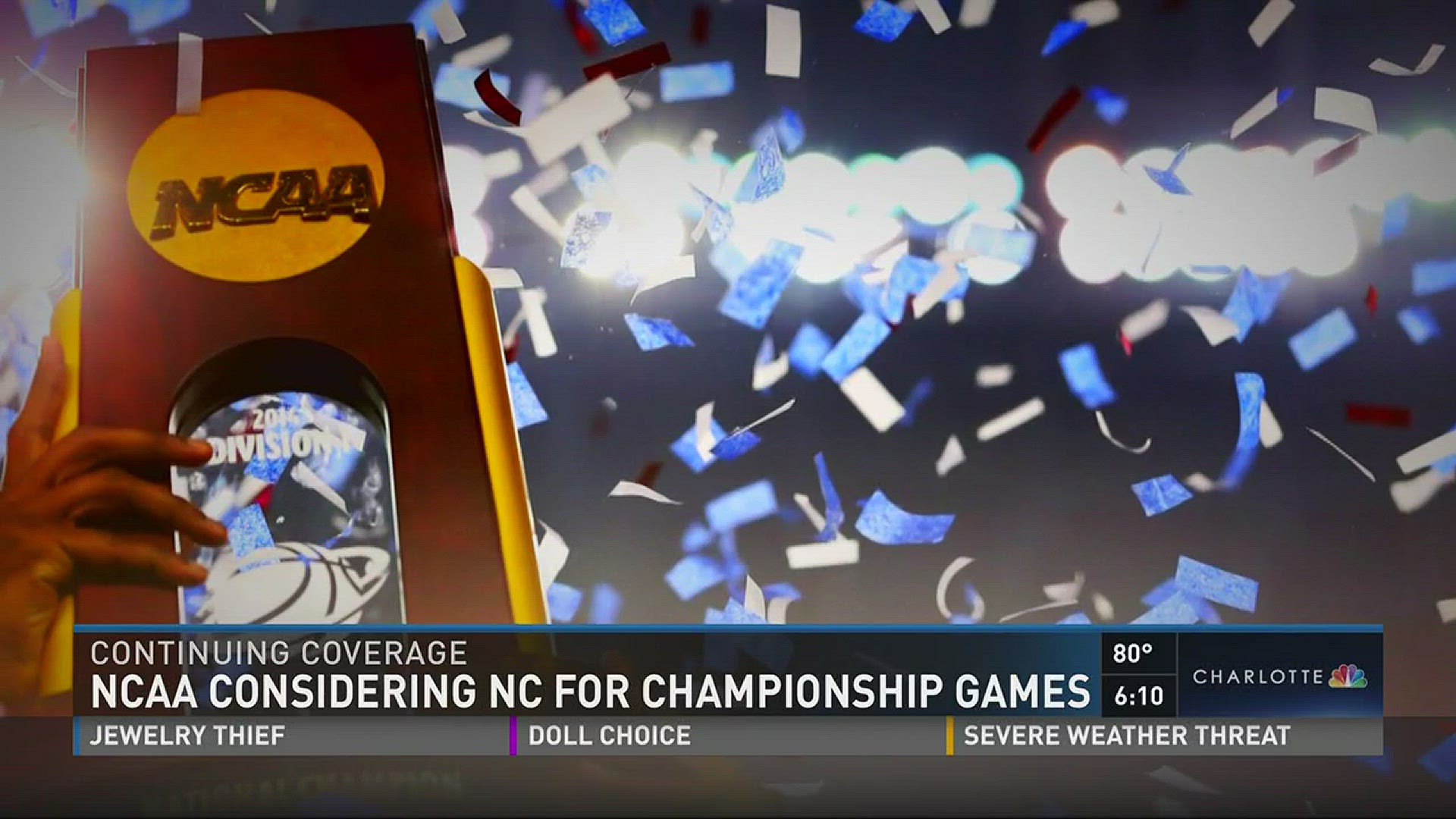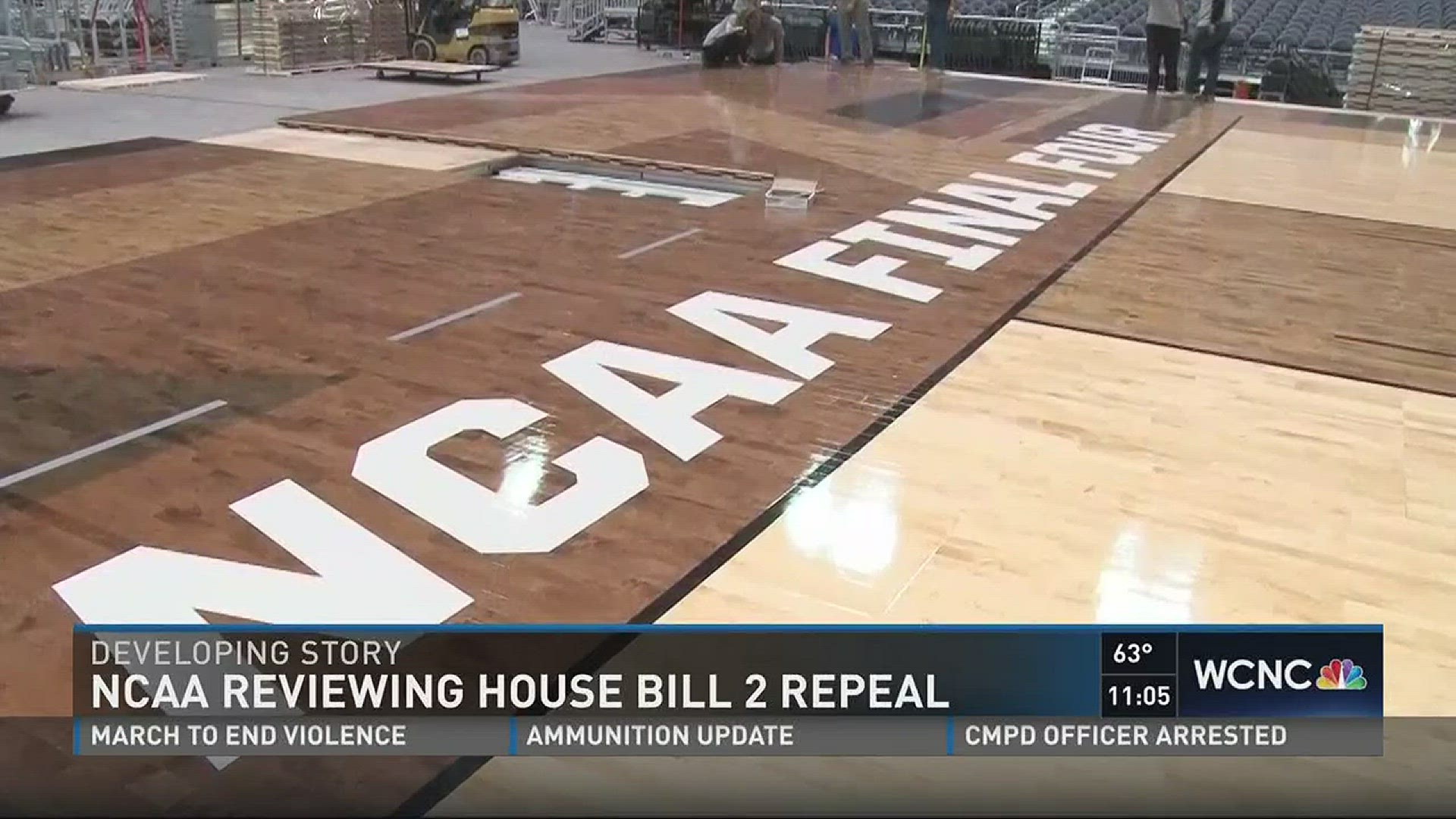CHARLOTTE, N.C. – The NCAA has officially responded to the repeal of House Bill 2.
In a statement released Tuesday morning, the NCAA Board of Governors said they have “reluctantly voted” to allow consideration of championship bids in North Carolina by committees that are presently meeting.
In March, the sanctioning body stated that North Carolina legislators would need to repeal HB2 or the state would again lose hosting rights in future tournaments. According to the Greensboro Area Convention and Visitors Bureau, NCAA tournament events moved to Greenville, S.C. cost the city an estimated $14.5 million.
"In August of 2016, the NCAA Board of Governors instructed the relocation of NCAA championships scheduled in North Carolina during the 2016-17 academic year because of the cumulative impact HB2 had on local communities’ ability to ensure a safe, healthy, discrimination-free atmosphere for all those watching and participating in our events.
Last week, the elected officials of North Carolina enacted compromise legislation that repealed HB2 and replaced it with a new law, HB142, that addressed a number of the concerns that led to the relocation of the NCAA championships. As with most compromises, this new law is far from perfect.
The NCAA did not lobby for any specific change in the law. The Board of Governors, however, was hopeful that the state would fully repeal HB2 in order to allow the host communities to ensure a safe, healthy, discrimination-free atmosphere for the championship sites. While the new law meets the minimal NCAA requirements, the board remains concerned that some may perceive North Carolina’s moratorium against affording opportunities for communities to extend basic civil rights as a signal that discriminatory behavior is permitted and acceptable, which is inconsistent with the NCAA Bylaws.
However, we recognize the quality championships hosted by the people of North Carolina in years before HB2. And this new law restores the state to that legal landscape: a landscape similar to other jurisdictions presently hosting NCAA championships.
We are actively determining site selections, and this new law has minimally achieved a situation where we believe NCAA championships may be conducted in a nondiscriminatory environment. If we find that our expectations of a discrimination-free environment are not met, we will not hesitate to take necessary action at any time.
We have been assured by the state that this new law allows the NCAA to enact its inclusive policies by contract with communities, universities, arenas, hotels, and other service providers that are doing business with us, our students, other participants, and fans. Further, outside of bathroom facilities, the new law allows our campuses to maintain their own policies against discrimination, including protecting LGBTQ rights, and allows cities’ existing nondiscrimination ordinances, including LBGTQ protections, to remain effective. (Emphasis added by NCAA)
In the end, a majority on the NCAA Board of Governors reluctantly voted to allow consideration of championship bids in North Carolina by our committees that are presently meeting. The NCAA championships previously awarded to North Carolina for 2017-18 will remain in the state. The board, however, directs that any site awarded a championship event in North Carolina or elsewhere be required to submit additional documentation demonstrating how student-athletes and fans will be protected from discrimination."
North Carolina Senate Leader Phil Berger and House Speaker Tim Moore responded to the NCAA's decision, saying in a joint statement they were pleased with the ruling.
“We are pleased with the NCAA’s decision and acknowledgment that our compromise legislation ‘restores the state to… a landscape similar to other jurisdictions presently hosting NCAA championships.’”
In a statement released last week, the Atlantic Coast Conference also said it is ready to start holding events again in North Carolina following the repeal. In September 2016, the conference pulled 10 neutral-site championships for the 2016-17 season due to the controversial law, including the coveted football championship, which was relocated from Charlotte to Orlando.
Governor Roy Cooper also released a brief statement Tuesday following the NCAA's announcement.
"Last week’s compromise was an important step forward for our state. While more work remains to be done, it’s good news that the NCAA will be returning to North Carolina. We will continue our work with them to fight for statewide antidiscrimination protections for LGBT North Carolinians."
The ACC also removed women's soccer, swiming and diving, golf, baseball, and women's basketball out of North Carolina in response to the law.


